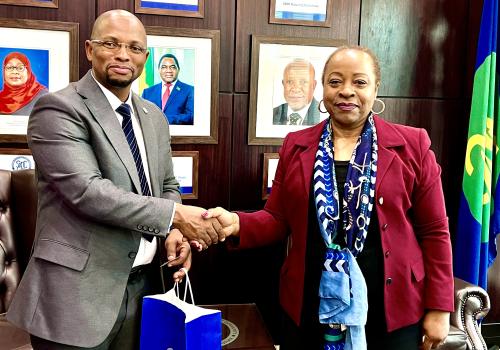Ms. Angéle Makombo N'Tumba, the Deputy Executive Secretary responsible for Regional Integration at the Southern African Development Community (SADC), met a delegation from the International Federation of Red Cross and Red Crescent Societies (IFRC) on 15th April 2024, in Gaborone, Botswana. The IFRC delegation was led by Mr. Kopano Masilo, the Coordinator of IFRC Pretoria Cluster. IFRC is a globally recognised humanitarian network with local Red Cross and Red Crescent structures in over 192 countries, mobilising nearly 14 million volunteers to serve humanity worldwide. The organisation plays a crucial role in the SADC region through its three clusters.
Ms. Makombo N'Tumba welcomed the IFRC delegation to SADC. She commended the strategic partnership that exists between SADC and IFRC, highlighting the considerable contribution of IFRC in facilitating the establishment of Early Warning Systems through among others equipping the SADC Humanitarian and Emergency Operations Centre (SHOC) and the establishment of the Regional Situation room. Located in Mozambique, the SHOC center is responsible for coordinating SADC's regional disaster risk preparedness, response, and early recovery efforts to support Member States affected by disasters.
Addressing the effects of climate change, Ms. Makombo N'Tumba highlighted the increasing prevalence of the El Nino induced drought in the region that has exacerbated food and nutritional insecurity in Sub-Saharan Africa. Furthermore, she highlighted the region's vulnerability to various natural hazards and the escalating occurrence of tropical cyclones, storms, and non-communicable diseases such as malaria and cholera, which severely strain economic resources.
Mr. Masilo expressed his gratitude to the SADC region for the collaboration and dedication, particularly acknowledging the Member States for their joint efforts in addressing global threats and risks, which can result in disasters. He acknowledged the current low rainfall this season, foreseeing reduced harvests and the potential for a humanitarian crisis in the Sub-Saharan Africa. He assured SADC of his organisation's commitment to providing support through technical expertise in the effective implementation of early warning systems, preparedness, response, and recovery efforts at both national and regional levels.
The Parties agreed to maintain close cooperation and regular consultation on the agreed areas of mutual cooperation, including humanitarian matters, early warning systems, community resilience, and other areas outlined in the Memorandum of Understanding (MoU) which was operationalised in June 2021. Among others, the Parties also agreed to strengthen their collaboration in identifying climate-related disaster risks, facilitating preparedness measures, and assisting vulnerable communities in adapting to climate change, with a specific focus on enhancing institutional capacities in disaster risk management and community resilience to effectively address future challenges. Noting that the MoU between SADC and IFRC comes to end in June 2024, the parties directed their technical teams to work together in reviewing the MoU with a view to extend its operational period.
Mr. Kopano Masilo, was accompanied by Ms. Naemi Heita, the Coordinator of IFRC Maputo Cluster, and Mr. John Roche, the Coordinator of IFRC Harare Cluster.

